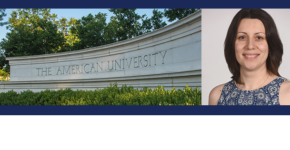 Trust in government is said to be at an all-time low.
Trust in government is said to be at an all-time low.
Anna Amirkhanyan, professor of public administration and policy at American University, digs down to find out if national trends are just spin.
Anna Amirkhanyan is a professor of public administration and policy at American University. Her research focuses on public and nonprofit management, organizational performance, public-private differences, and citizen participation. Her book, Citizen Participation in the Age of Contracting: When Service Delivery Trumps Democracy (Routledge, 2018) offers an account of how contracting of public services has come at the cost of transparency and participation. Her articles have appeared in peer-reviewed outlets that include the Journal of Public Administration Research and Theory (J-PART), Public Administration Review, the Journal of Policy Analysis and Management, the Nonprofit and Voluntary Sector Quarterly, and others.
Are We Biased Against Government?
The right to be critical of one’s government is inherent in a democracy. But when not based on evidence, negative views of government institutions can be harmful for the government, the people, and the society. They can discourage individuals from paying taxes, complying with life-saving regulations, and seeking careers in public schools, hospitals, and law enforcement agencies.
To test how strong Americans’ bias against government is today, my colleagues Ken Meier, Miyeon Song, Jourdan Davis, and I compared how citizens evaluate the efficiency and effectiveness of government agencies compared to nonprofit and for-profit organizations, when they are presented with simple and unambiguous facts about these entities. We also explored if government is seen as less credible as a source of information, compared to nonprofit and for-profit sources.
Our randomized survey experiment asked approximately 1,600 participants to read and comment on a story about one of the most essential of all public services: nursing home care. The findings took us by surprise. Not only were government-run nursing services perceived just as favorably by our respondents as services in the private sector, but the information that our subjects received from government and nonprofit sources was perceived as more credible than from the private sources.
These findings are particularly vital during the COVID-19 pandemic when trust in government messaging has been subject to political spin often with life-and-death repercussions.
Our study shows that clear and credible information from government and nonprofit sources can break through the blizzard of disinformation and help citizens to make informed choices.


Comments
3 responses to “Anna Amirkhanyan, American University – Are We Biased Against Government?”